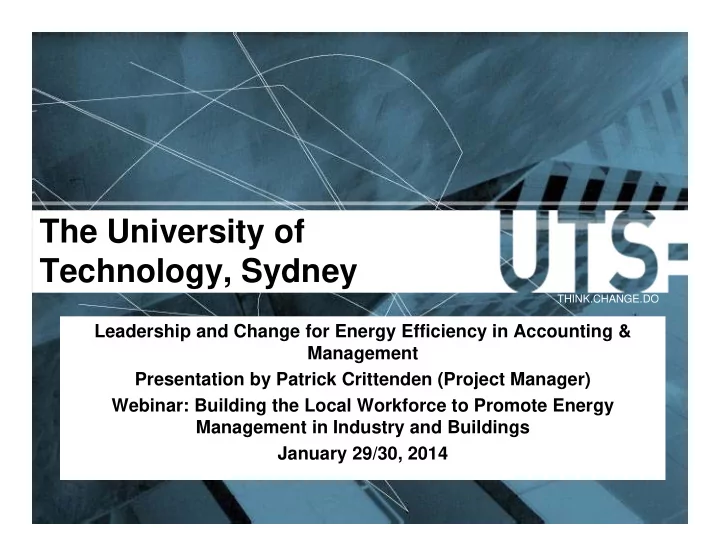

The University of Technology, Sydney THINK.CHANGE.DO Leadership and Change for Energy Efficiency in Accounting & Management Presentation by Patrick Crittenden (Project Manager) Webinar: Building the Local Workforce to Promote Energy Management in Industry and Buildings January 29/30, 2014
Outline > Project background and rationale > Training Needs Analysis > Description of the pilot training and materials developed > Key lessons learnt and future activities Project material including teaching resources is available on the project website http://www.business.uts.edu.au/energyefficiency/
Project Background & Rationale
Project funding > Office of Environment & Heritage NSW. > The ‘Energy Efficiency Training Program’ aims to support the development and delivery of higher education courses that enhance energy efficiency knowledge and practice. > Seehttp://www.environment.nsw.gov.au/sustainbus/g reenskills/eneftraining3.htm for a description of the other projects
Key Project Partners > UTS Business School > Ernst & Young > Chartered Institute of Management Accountants (CIMA) > The Westpac Group > TAFE NSW, Sydney Institute
A comprehensive approach
Offerings matched to target audiences
Project Overview Training Needs Analysis Interactive seminars Evaluation C-suite webinar Teaching cases Modular 2-day course Integrated university offerings
Warren-Myers Lorenz 2008, 2012 A social network perspective
Training Needs Analysis
Training Needs Analysis – Key Themes > Organisational response to energy efficiency needs to be cross-disciplinary – Accountant and manager as business partner > Confirmed that there is interest and demand for energy efficiency training and materials for accountants and business managers > Soft skills as well as analytical/ technical skills are important
Training Needs Analysis – Key Themes (cont.) > The rationale for action/ importance of energy efficiency is a fundamental starting point > Application/ approach will vary across: – Public and private sector – Type of industry sector – Firm strategy – Firm culture
Training Needs Analysis - Skills Soft Energy Efficiency Fundamentals Skills Developing the business case for an Energy Efficiency project Extending accounting tools to an Energy Efficiency context Modifying information systems to support Energy Efficiency Budgeting & Finance
Education and Training Pilot Program and Materials Development
Two-hour interactive seminars > Aim: Short package of material to be explored interactively. > Applications: – Vocational Education and Training Teachers – In-house at the Westpac Group – Lunch seminar with the CPA Australia – Corporate Social Responsibility discussion forum – Evening presentation with members of the Chartered Institute of Management Accountants
C-suite webinar > Aim: One hour webinar to enhance accessibility for Chief Financial Officers and other senior managers > Content: – Focus on business drivers – Considerations regarding the firm-level business case for action on energy efficiency – Draw on successful cases
Modular 2-day Course > Aim: Comprehensive training for mid-level managers and accountants > Content: – Introduction to energy – Accounting and reporting considerations – Incorporating non-financial data into organisational decision making – Funding mechanisms for energy efficiency – Evaluating energy efficiency opportunities – Communication and effective presentations – Presenting the business case
Integrated University Offerings > Aim: To integrate energy efficiency teaching into existing undergraduate and postgraduate accounting courses > Undergraduate courses: – 22107 Accounting for Business Decisions – 22321 Cost Management Systems > Postgraduate courses: – 22753 Cost Management and Analysis – 21832 Managing for Sustainability
Evaluation > Includes: – Data from assignments and post training/education evaluation – Focus groups with participants 6-8 months after training to identify actions being taken – Actions taken by partners and the project steering committee to promote the role of energy efficiency within accounting and management
Some reflections … > Collaboration throughout the process is essential to achieve longer term integration – Consultation throughout the process – Provide sufficient resources and support – Acknowledge effort and achievement > Future challenge is to bring engineers and accountants together to learn from each other and share perspectives on effective change for energy efficiency
Further information … > Please use and modify our material – but acknowledge our work and let us know how you go! http://www.business.uts.edu.au/energyefficiency/ > And please don’t hesitate to contact us if we can help: – Patrick Crittenden, Project Manager, patrick@sbusiness.com.au – Professor Suzanne Benn, Professor of Sustainable Enterprise, UTS Business School suzanne.benn@uts.edu.au – Dr Paul Brown, UTS School of Accounting, Paul.J.Brown@uts.edu.au
Recommend
More recommend